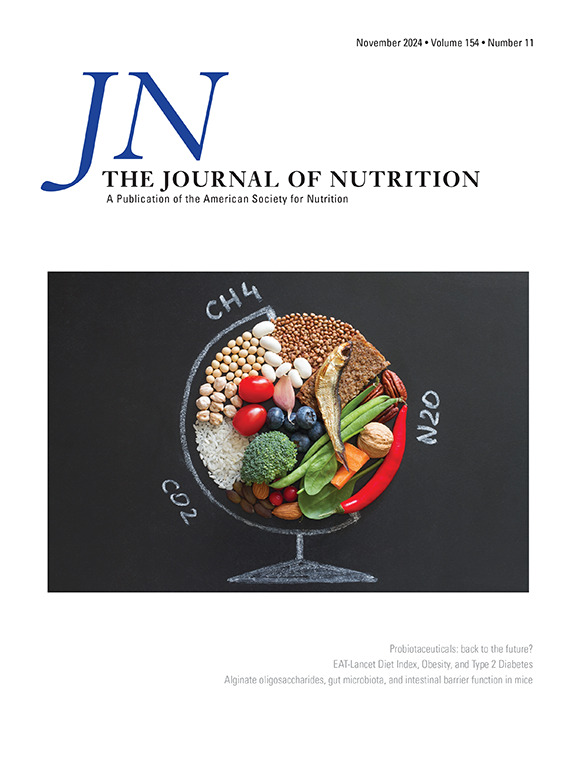Heat Treatment of Bovine Milk Influences Gastric Emptying of Lactose but not its Apparent Small Intestinal Disappearance in the Growing Pig as a Model for the Adult Human
IF 3.8
3区 医学
Q2 NUTRITION & DIETETICS
引用次数: 0
Abstract
Background
Heat treatment influences gastric emptying of proteins and lipids in bovine milk. Whether heat treatment influences lactose gastric emptying and small intestinal lactose disappearance remains unknown.
Objectives
This study aimed to determine the gastric emptying of lactose and its disappearance from the small intestine of the growing pig as a model for the adult human.
Methods
After 10 d of adaptation, fasted 9-wk-old pigs (n = 48) consumed 500 mL of pasteurized or ultra-high-temperature (UHT) bovine milk before being killed at 20, 60, 120, or 180 min post-feeding. Gastric, small, and large intestinal contents were collected to determine the gastric emptying of lactose, its apparent small intestinal disappearance, and its release into the large intestine. Portal vein blood samples were also collected to measure galactose concentration over time. Data were analyzed using nonlinear and polynomial models.
Results
The gastric emptying of lactose was faster for pigs fed pasteurized milk than those fed UHT milk (P ≤ 0.05). For example, 14 ± 2.9% and 24 ± 2.2% (mean ± standard error) of lactose, respectively, were retained in the stomach at 60 min post-feeding. The apparent small intestinal disappearance of lactose increased to 88 ± 2.4% over time, but it did not differ between milk types. Similarly, the plasma galactose concentration in the portal vein increased during the first post-feeding hour but did not differ between milk types. Lactose reached the large intestine during the first 20 min post-feeding, and the amount of lactose released into the large intestine did not change over time (523 μmol on average across post-feeding times after back transformation of 6.26 ± 0.37) or between milk types.
Conclusions
Heat treatment influenced the gastric emptying of lactose but did not impact subsequent small intestinal apparent disappearance and portal blood plasma galactose appearance.
牛乳的热处理会影响乳糖的胃排空,但不会影响生长猪作为成人模型中乳糖在小肠中的明显消失。
背景:热处理会影响牛乳中蛋白质和脂质的胃排空。热处理是否会影响乳糖的胃排空和小肠乳糖的消失仍是未知数:本研究旨在确定生长猪作为成人模型的乳糖胃排空及其在小肠中的消失情况:方法:经过 10 天的适应期后,禁食的九周龄猪(48 头)饮用 500 毫升巴氏杀菌或超高温(UHT)牛乳,然后在进食后 20、60、120 或 180 分钟安乐死。收集胃、小肠和大肠内容物,以确定乳糖的胃排空、小肠明显消失和释放到大肠的情况。还采集了门静脉血液样本,以测量随时间变化的半乳糖浓度。数据采用非线性和多项式模型进行分析:结果:饲喂巴氏杀菌奶的猪比饲喂超高温杀菌奶的猪胃排空乳糖的速度更快(P ≤ 0.05)。例如,在饲喂后 60 分钟,分别有 14±2.9% 和 24±2.2%(平均值 ± 标准误差)的乳糖滞留在胃中。随着时间的推移,乳糖在小肠中的表观消失率增至 88±2.4%,但不同类型的牛奶之间并无差异。同样,门静脉中的血浆半乳糖浓度在喂食后的第一个小时内有所增加,但不同类型的牛奶之间并无差异。乳糖在喂食后的最初 20 分钟内到达大肠,释放到大肠的乳糖量并没有随着时间的推移而发生变化(喂食后各时间段的平均值为 523 μmol,反向转化后为 6.26±0.37),也没有随着牛奶种类的不同而发生变化:热处理会影响乳糖的胃排空,但不会影响随后的小肠表观消失和门静脉血浆半乳糖的出现。
本文章由计算机程序翻译,如有差异,请以英文原文为准。
求助全文
约1分钟内获得全文
求助全文
来源期刊

Journal of Nutrition
医学-营养学
CiteScore
7.60
自引率
4.80%
发文量
260
审稿时长
39 days
期刊介绍:
The Journal of Nutrition (JN/J Nutr) publishes peer-reviewed original research papers covering all aspects of experimental nutrition in humans and other animal species; special articles such as reviews and biographies of prominent nutrition scientists; and issues, opinions, and commentaries on controversial issues in nutrition. Supplements are frequently published to provide extended discussion of topics of special interest.
 求助内容:
求助内容: 应助结果提醒方式:
应助结果提醒方式:


